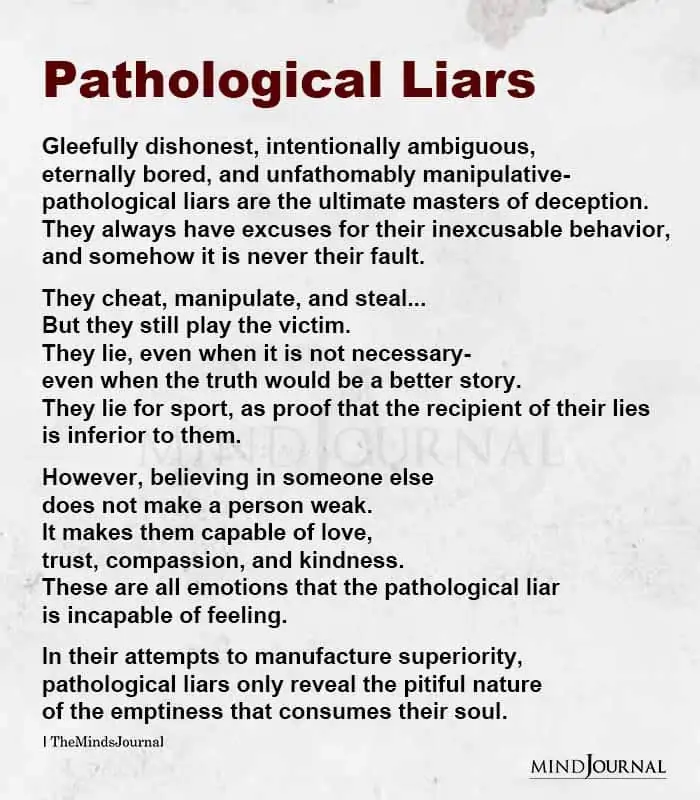Catching a liar or recognizing liars and their lies can seem a bit mind-boggling at times, but looking out for a few signs can help you detect when someone is trying to trick you or is being dishonest.
Key Points
- Violation of four conversational maxims may signal deception.
- Maxims include providing sufficient information, having evidence, being relevant, and matching tone with content.
- Monitoring maxim violations can determine the veracity of what is being said.
Truth is often elusive or at best described as “my truth,” which does not always comport with reality. Grice (1975) developed four maxims that guide conversations. A violation of one or more of the four maxims may signal deception.
Related: Why Narcissists Lie About Their Health: 3 Reasons Behind A Narcissist Lying About Illness
4 Keys To Catching A Liar
1. Provide Sufficient Information
Make your contributions to a discussion as informative as possible. In other words, include sufficient information to support what you are saying.
Do not add too much information, which, as Grice states, becomes a waste of time. Providing too much information can often confuse listeners. Adding too much information can also raise ancillary issues.
Liars often violate this maxim by providing too little information to prevent listeners from verifying the information presented, thereby preventing the truth from being discovered. Conversely, liars often provide too much information camouflaging the truth in an avalanche of details.
Unraveling a convoluted set of statements is too tedious for casual listeners. Instead of deciphering what was said, listeners simply move the conversation to less complicated topics. In this manner, liars avoid having to tell the truth.

2. Always Have Evidence
Do not say what you believe to be false. In other words, do not say anything that you do not have sufficient evidence to support.
Liars typically tell the truth up to the point where they want to withhold information, skip over the withheld information, and then resume telling the truth.
In this manner, liars only provide facts that can be verified. Withholding information is the most commonly used technique to lie because liars only have to remember the information they intentionally withheld. Withholding information creates information gaps.
Schafer (2016) identified the most commonly used words that liars use to bridge information gaps, which were labeled text bridges. They are then, so, after, when, as, while, and next. Text bridges identify where liars intentionally withhold information. Identifying text bridges provide specific areas in a conversation that require additional inquiry to uncover the hidden truth.
Related: 4 Types Of Lying
3. Stay Relevant
Keep your contributions to the conversation relevant. In other words, make logical contributions to the conversation. When facts are presented out of logical sequence, the story becomes less believable. Any forced change in the logical sequence of the conversation is a violation of this maxim.
Liars often change the focus of the discussion from topics they want to avoid to topics that are not related to the information they wish to conceal. In doing so, liars use misdirection to avoid telling the truth or, for that matter, lie about the truth.
Misdirection shifts responses away from threatening questions or topics. The overuse of misdirection tends to discredit the speaker, especially when the speaker is asked to address specific topics or provide detailed answers to specific questions.
4. Match Tone and Content
The manner in which things are said must comport with what is being said. This maxim relates to how information is communicated. Sad people communicating sad information will display a sad countenance. Conversely, happy people communicating happy information will display a happy countenance. People’s nonverbal expressions should be in sync with their verbal messages. Any incongruence may signal deception.
Violation of one or more of the Gricean conversational maxims may signal deception. Maxim violations also produce information that was not originally presented in the conversational exchange. For example, if you ask someone how they liked the party they attended last evening and they respond with a smile, “It was okay. I went to dinner afterward.” violates several Gricean maxims. Maxim 1 was violated.
Related: Recognizing Liars: Habitual Liars And Their Agendas
The speaker did not include sufficient information. The absence of information leads the listener to assume the speaker did not enjoy the party. Maxim 3 was violated because the speaker abruptly changed the direction of the conversation from the party to having dinner after the party. Maxim 4 was violated in that the negative message conveyed by the speaker did not comport with the smile the speaker displayed.
Based on the violations of the Gricean maxims, a high probability exists the speaker did not provide truthful information or, at best, intentionally withheld information in an effort to avoid disparaging the host of the party. Monitoring conversations for violations of the Gricean maxims is a simple way to detect deception or identify intentionally withheld information.
References:
Grice, H. P. (1975). Logic and Conversation. In P. Cole & J. Morgan (Eds.), Speech acts (pp. 41–59). Syntax and Semantics. Academic Press. Schafer, J. R. & Navarro, J. (2016). Advanced interviewing techniques: Proven strategies for law enforcement, Military, and Security Personnel. Charles C. Thomas Publishers, Springfield, Illinois.
Written By Jack Schafer Ph.D. Originally Appeared On Psychology Today









Leave a Reply
You must be logged in to post a comment.